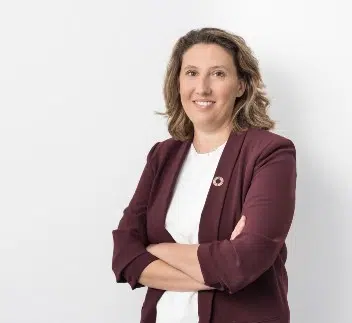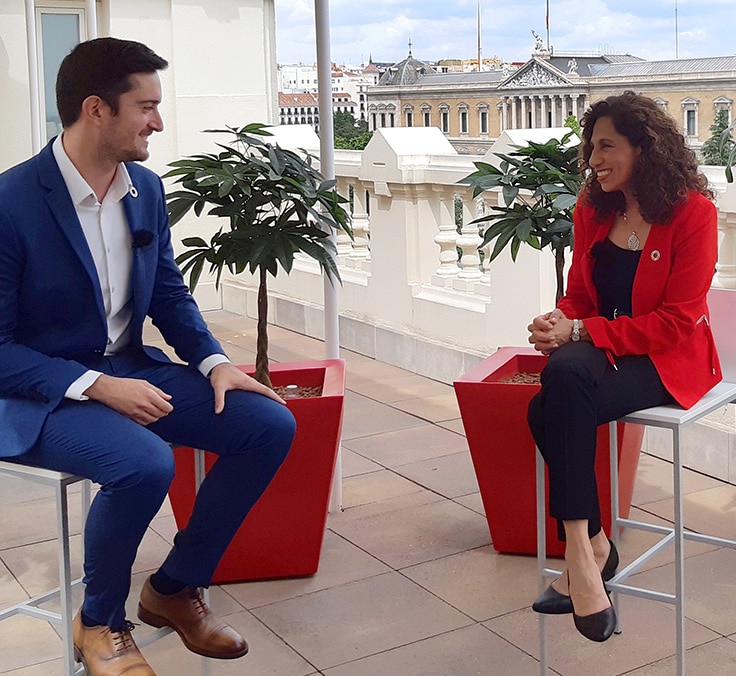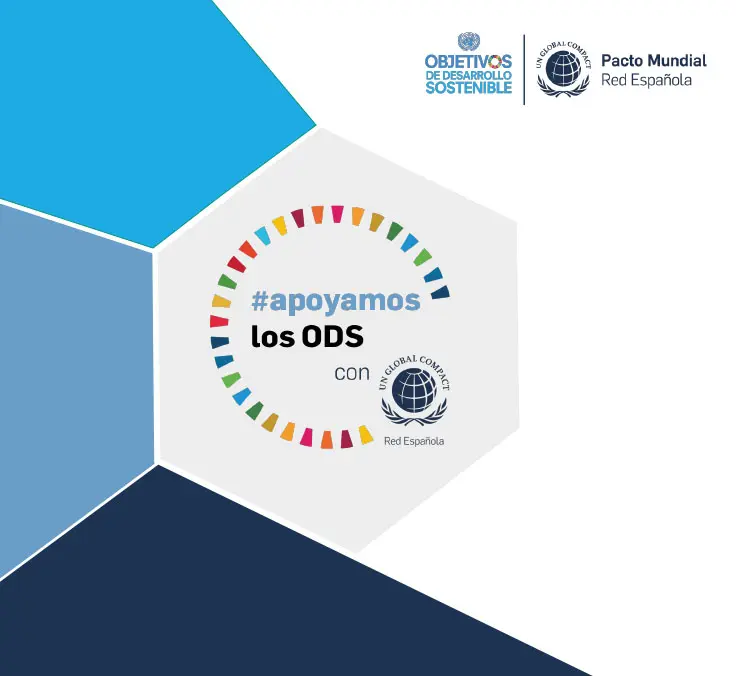SUSTAINABILITY| 19.09.2022
“We need more commitment, more ambition and more action to make good on the 2030 Agenda”
We interview Cristina Sánchez, executive director of the UN Global Compact in Spain, to discuss the role of companies in achieving the goals of the 2030 Agenda, a unique opportunity for countries and societies to face the challenges posed by climate change, decrease poverty and promote diversity and inclusion, in addition to other factors.
 The contribution of companies is key to achieving the goals of the 2030 Agenda. How do you think companies are responding to the goals set out?
The contribution of companies is key to achieving the goals of the 2030 Agenda. How do you think companies are responding to the goals set out?
Achieving the goals of the 2030 Agenda is something that we have to achieve together, and companies have a critical role to play. This year, we have published our report on the business consultation about sustainable development, as part of which gaged the opinion of companies in relation to sustainability and assessed their commitment. We obtained a response from more than 2,500 Spanish companies, which represents the biggest corporate listening exercise performed in our country to date. Based on the responses, we can conclude that companies are becoming more aware, and are looking to achieve the Sustainable Development Goals, although there is still a long way to go.
The Sustainable Development Goals are in a ripening period. Not only have we moved from positive knowledge of the framework in 2018 (69%) to general knowledge in 2022, with 86% of Spanish companies asserting that they are aware of it, but the SDGs now form part of corporate strategies and the business structure.
Specifically, according to the results of our business consultancy exercise, 41% of companies assert that they have a sustainability strategy in place, of which 78% are aligned with the SDGs, consolidating the 2030 Agenda as the reference framework when it comes to sustainability.
In terms of the size of companies, all are making progress with the results of surveys performed in the past, although major firms continue to lead the way: 73% of major firms claim to have in-depth knowledge of the SDGs compared to 42% of SMEs and microenterprises.
Is it possible to say that we’re headed in the right direction?
There are just 8 years left to achieve the goals of the 2030 Agenda and the figures suggests there is still a long way to go. Our study has revealed that there is a significant gap between policies and measures. In other words, companies with a commitment to the SDGs and the 2030 Agenda who then do not take specific action. We have also reached conclusions, such as the fact that companies are now starting to include ESG (environmental, social and governance) criteria and that 41% of companies have a sustainability strategy. According to our research, 57% of companies have dedicated sustainability positions or departments and at 33% of companies, this department reports directly to the most senior person at the company.
Companies are progressively more aware; however this needs to be reflected in their efforts and making these efforts measurable. Establishing sustainability indicators that make it possible to ascertain the performance of companies is critical to assess the impact of the actions taken and identify areas for improvement. According to the most recent United Nations report on compliance with the Sustainable Development Goals, we are not making progress at the rate required to achieve the goals of the 2030 Agenda, meaning that we need more commitment, ambition and action.
And turning to society in general, how is the message of the 2030 Agenda being interpreted? Are citizens and administrations still committed?
Progress continues to be made disseminating the 2030 Agenda; however, our aim cannot merely be that people are aware of it, we must mobilize all these stakeholders to take action. In the case of companies, for example, they should be used as a catalyst for the Agenda among their stakeholders, which would have a relevant impact when you take consumers, the workforce, providers, etc. into account.
There is greater commitment, and European and national regulations are being passed, which helps, but these need to be transformed into actions, as the years are passing by and we are not making progress at the pace needed to achieve the goals of the 2030 Agenda. The UN has made it clear: we have two options. The first is to abandon the commitment to helping those who are most vulnerable, and the second is to make additional efforts to achieve the Goals and build a better future for people and the planet in 2030. Obviously, at the Global Compact, we have chosen the second option.
The pandemic has been a tumultuous period. How do you think this global crisis has affected the corporate management of the 2030 Agenda objectives? What opportunities for improvement have been identified as a result of this crisis?
Two years ago, at the peak of the pandemic, we asked companies this and 82% responded that the implementation of the Sustainable Development Goals could help make their company more resilient and improve their response to future crises like the COVID-19 crisis. After two such difficult years, 79% of the companies consulted asserted that there are competitive advantages when it comes to implementing the SDGs and 49% asserted that integrating sustainability has had a positive impact on the company’s financial income. We are secure in the knowledge that sustainability has not fallen by the wayside as a result of the health crisis. Progress has been made with internal measures related to striking a work-life balance or flexibility and greater emphasis is being placed on digitalization. Companies are progressively adapting their environmental requirements and the circular economy has demonstrated the interest amongst Spanish companies. Generally speaking, the commitment of companies is on the up. For example, there has been a 20% increase in the number members of the Global Compact in Spain over the past year.
Where do you think we should work in the coming eight years to achieve these objectives? Which the urgent areas we are going to focus on?
We are on the precipice and we are facing a range of challenges that are underscored by a triple crisis: climate change, the health crisis and armed conflicts. This is a priority. And to face them, we need more ambition from all stakeholders. However, the Agenda also has a local approach. Depending on the region in question, there are other emergencies related to the occupational situation, inequalities or poverty, for example. That’s why the approach taken by businesses cannot lose sight of this local dimension.
The Global Compact is going to place an emphasis on specific pillars that we believe are key for Spanish companies to be part of the solution. Firstly, offering tools and solutions for companies to adopt a management approach in response to the climate emergency. Secondly, promoting sustainable finance in the private sector, which is fundamental for efforts to catalyze the 2030 Agenda to have financial muscle. We have launched a CFOS Coalition with a view to contributing ten trillion dollars to the Agenda. Thirdly, we need more allies. We are collaborating with major companies, as well as SMEs and supply chains. More leaders are required who understand how to do business. It is not just about making money. And sustainable development opens up a world of opportunities for them. We already have more than 1,000 partners in Spain alone; however, as I was saying, there is still a long way to go.
What message would you launch to our readers? How can they contribute to sustainable development and the objectives of the 2030 Agenda?
We all have a very important role to play, each of us in the different roles we play in our lives. I want to appeal to two of these roles. As workers, we need to align the occupational decisions we take each and every day with the purposes of the Agenda. All professionals can contribute to the organization enforcing its commitment to sustainable development, not just those working in the field of sustainability or the environment. The role of finance, purchase, human resources departments, etc. is critical. Elsewhere, we have to be conscious consumers. Transferring the concept of sustainable development to our purchases. This is a good way of converting our habits and influencing companies that offer products and services, encouraging competition for sustainable offers. It is important that we act aware of the fundamental role we all play.
A collective response
At MAPFRE, we share this message and are aware that it is the time to take action. We find ourselves in a Decade of Action characterized by a sense of urgency and a unique opportunity to work together to tackle global social and environmental challenges. Now is the time to act, and each of us must play our part.
We know that the response to global challenges can only be collective.
We believe that small actions add up to create big changes, which is why we aim to contribute to this process through demanding and unequivocal commitments to social and environmental aspects, with services and products aligned to them and governance that allows us to continue making responsible progress in the right direction.
We are totally committed to the 2030 Agenda and the UN Sustainable Development Goals. This framework is essential to leading the sustainable transformation of companies, in the face of growing demands from their different stakeholders.
Our claim of #PlayingOurPart represents the commitment that is shared by everybody to form part of the shared objective of building a more sustainable world, and therefore a fairer, more prosperous, ethical, egalitarian, diverse, collaborative and ecological world.
RELATED ARTICLES:




